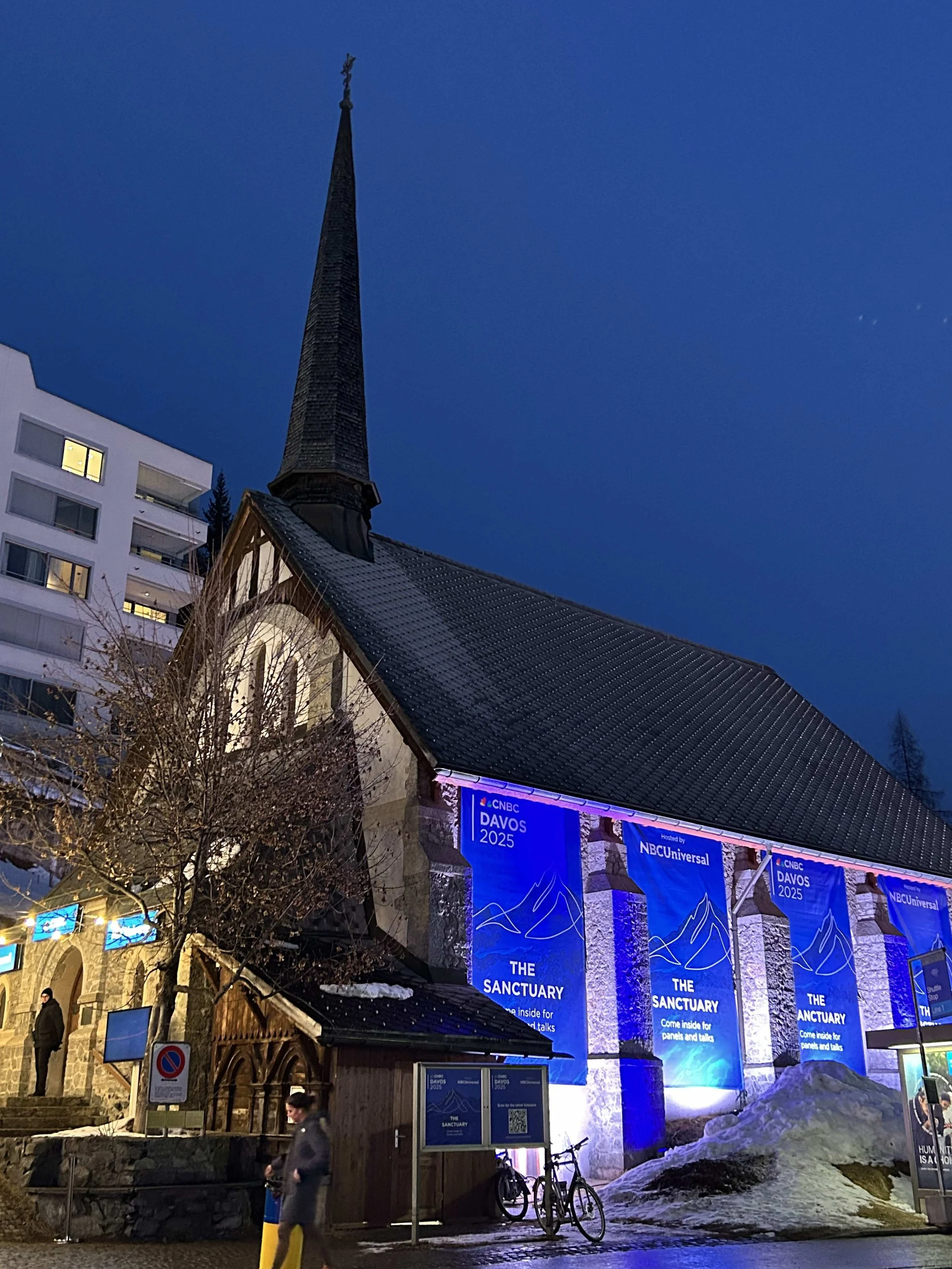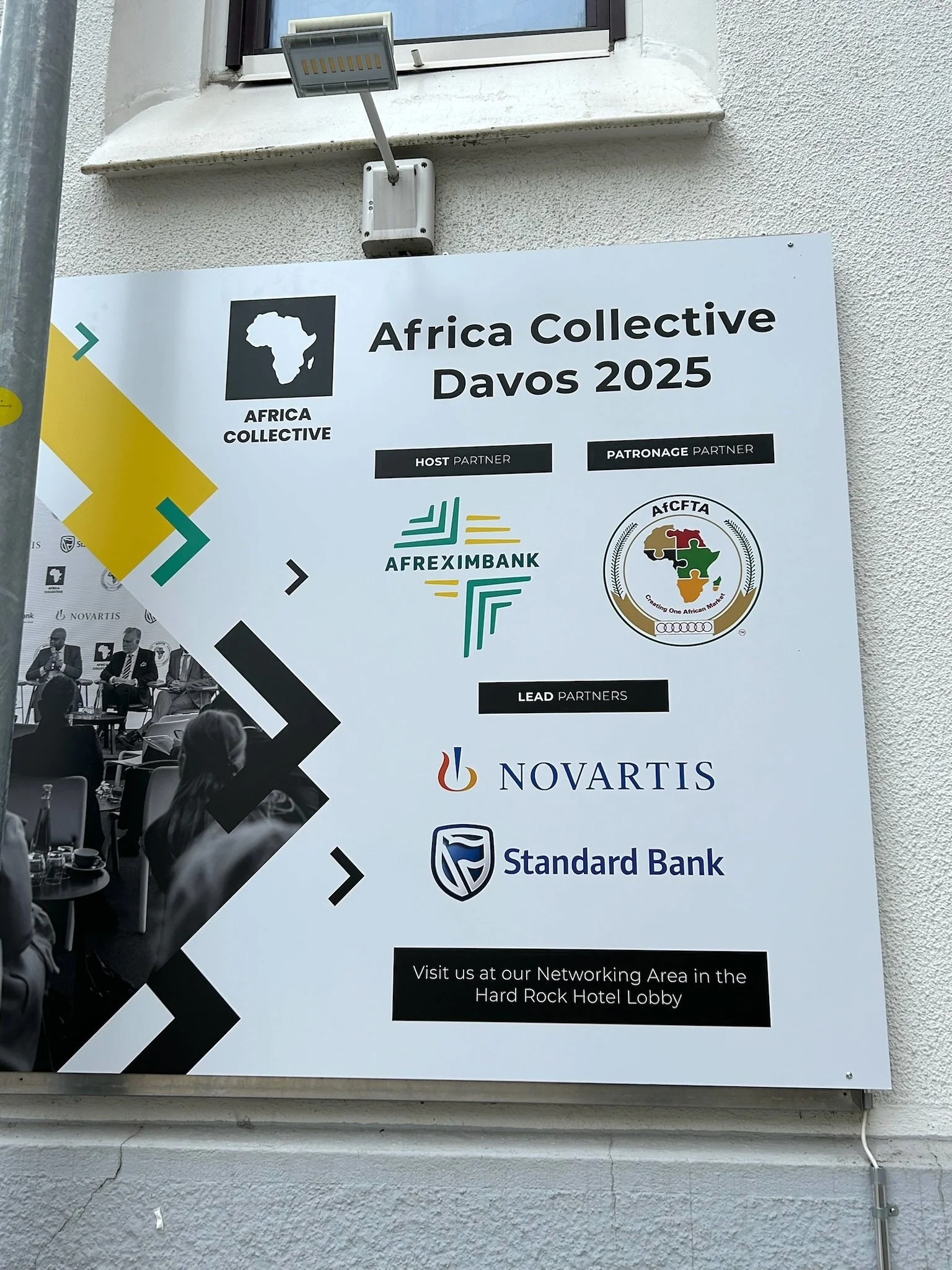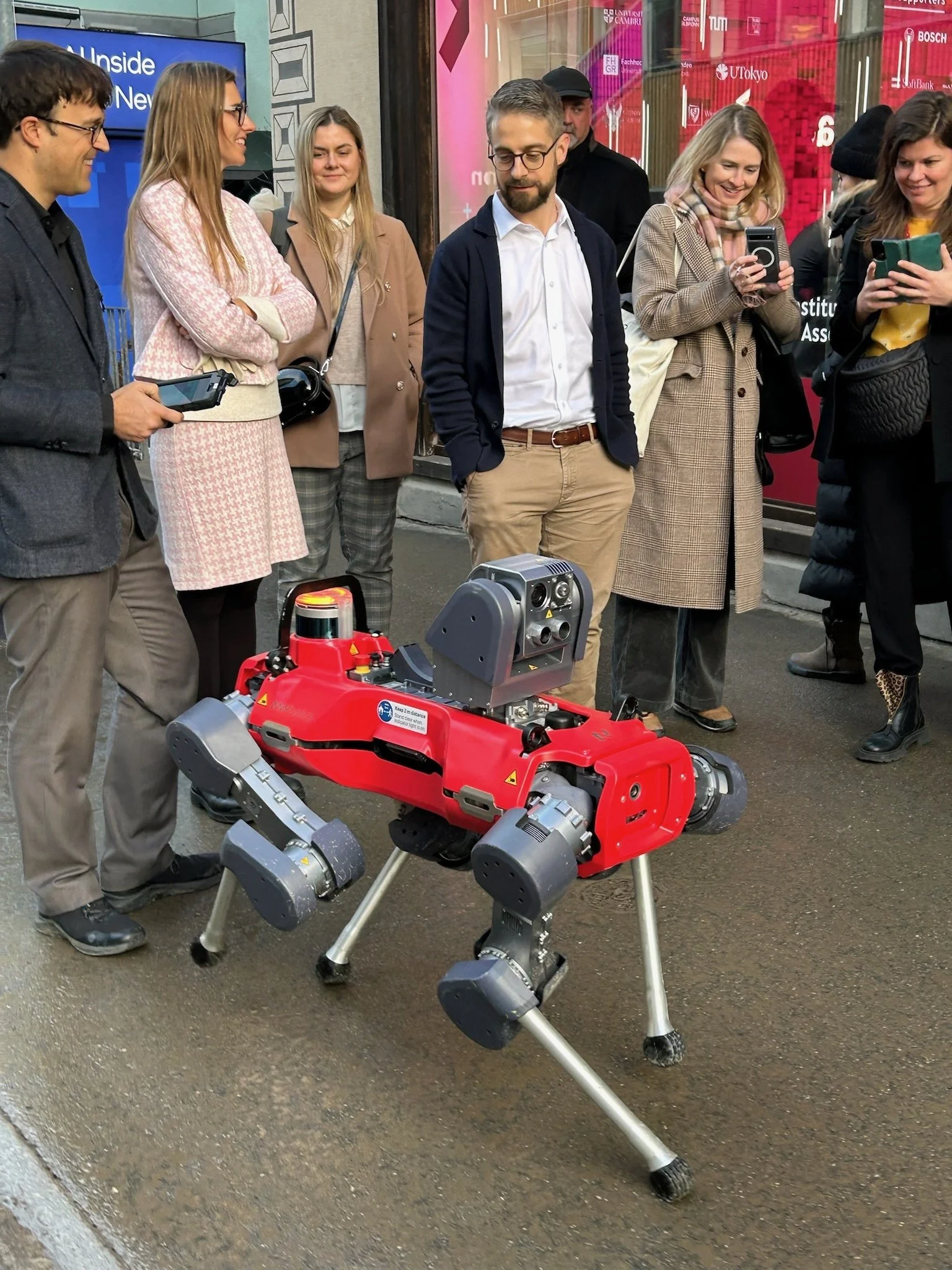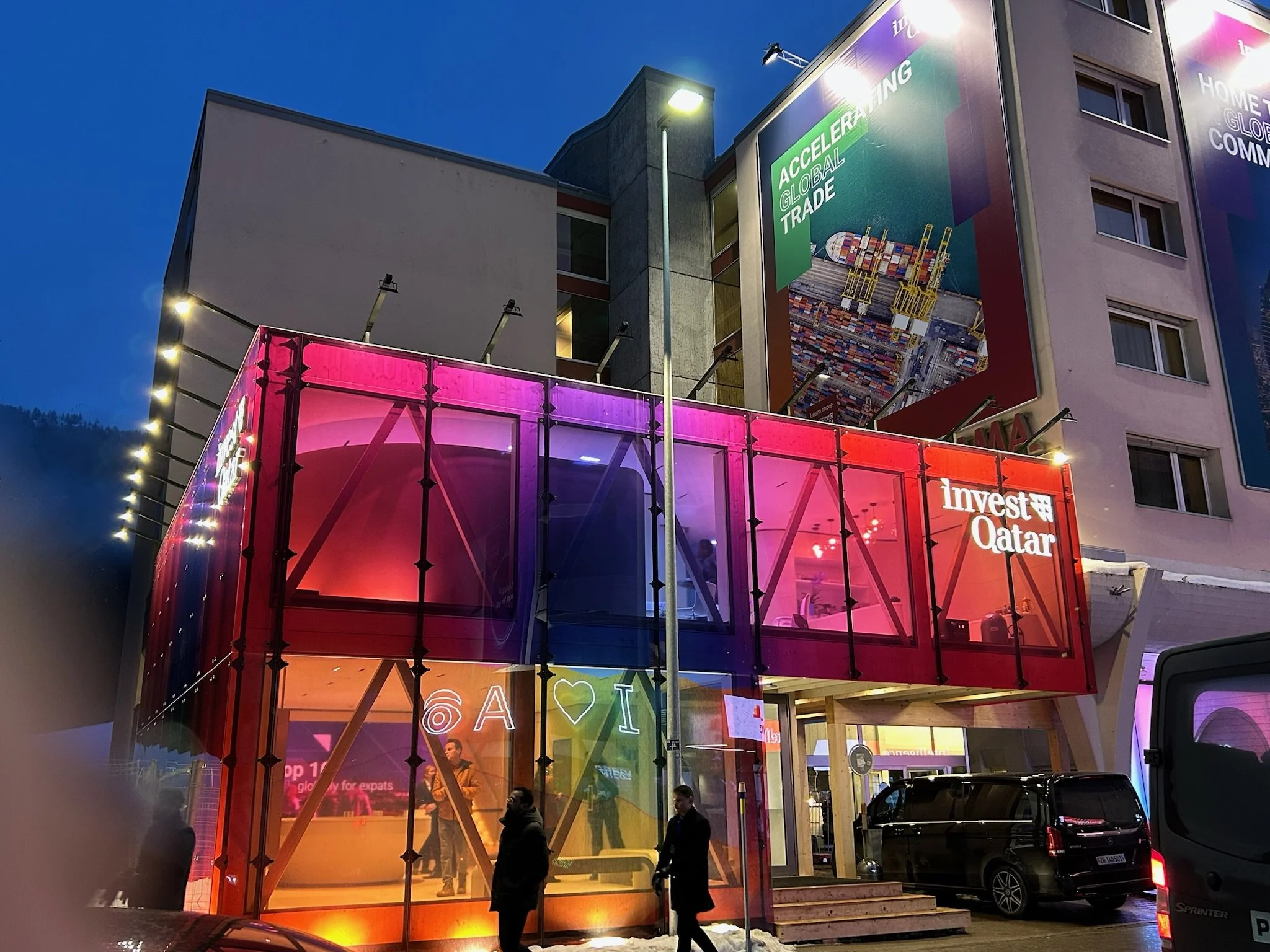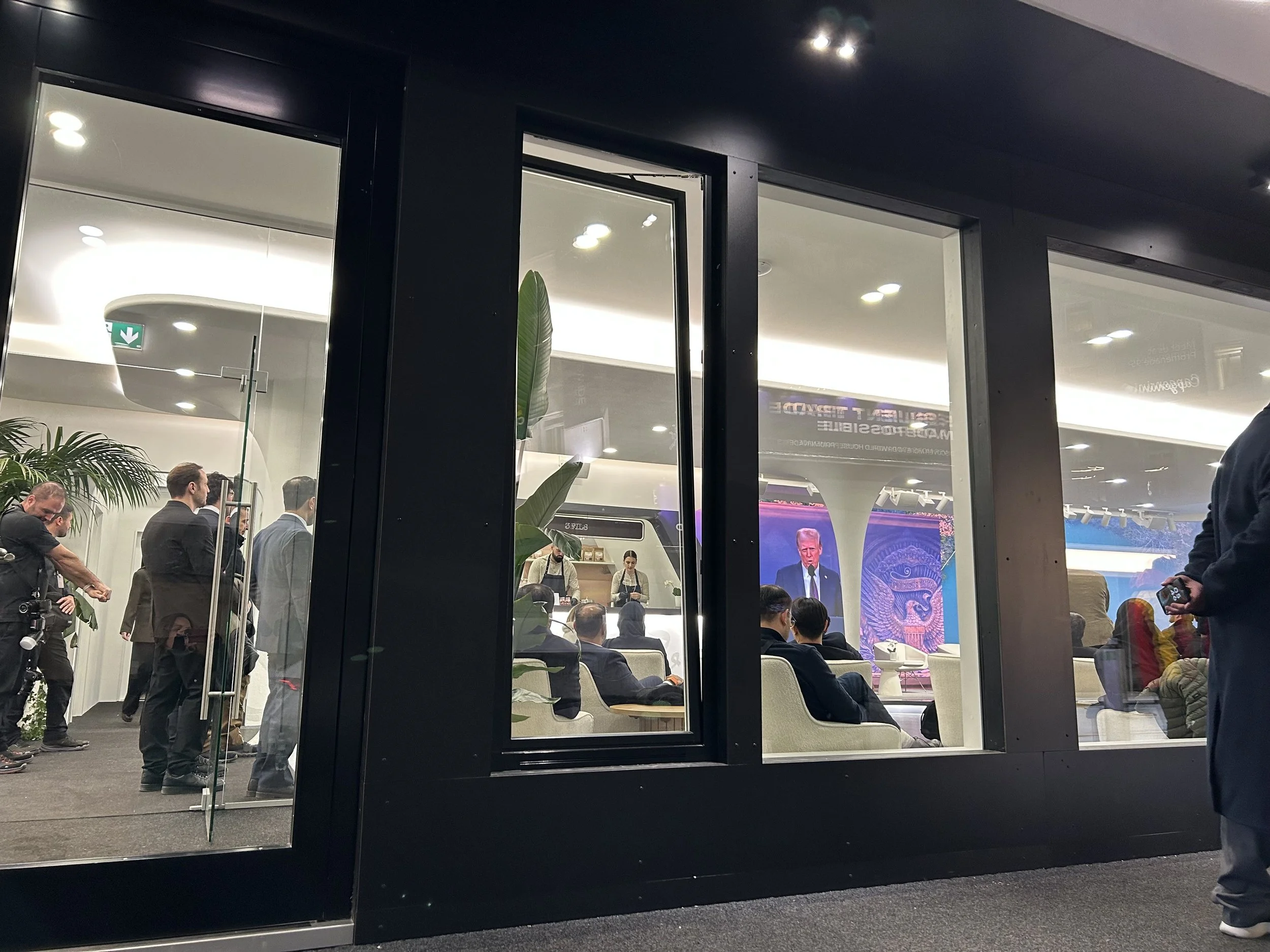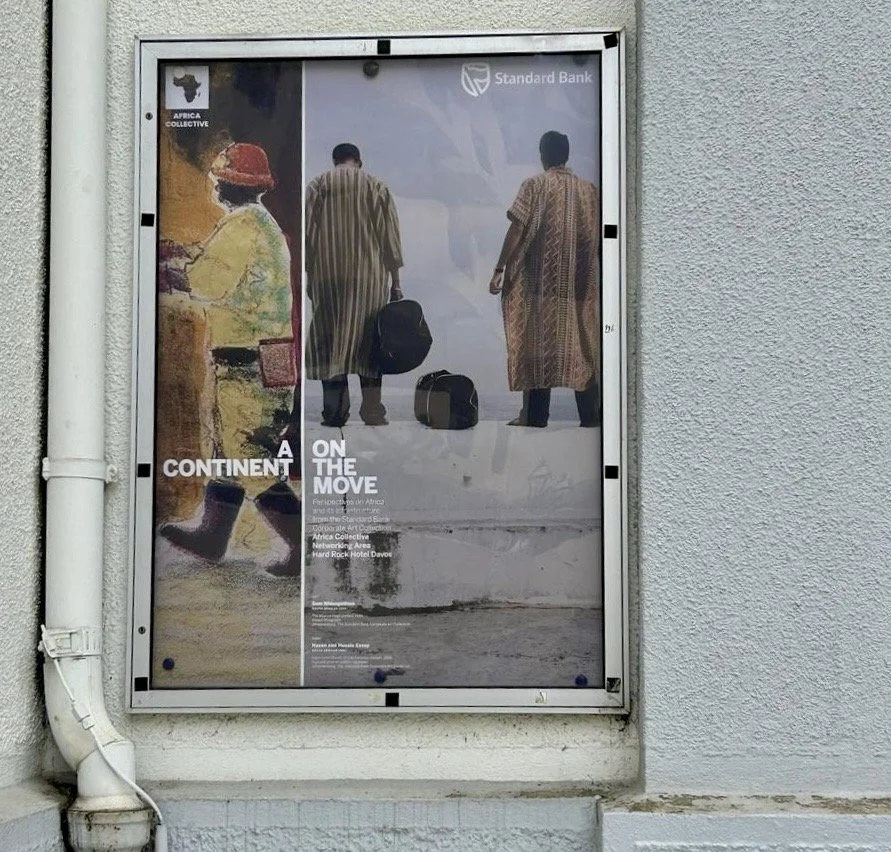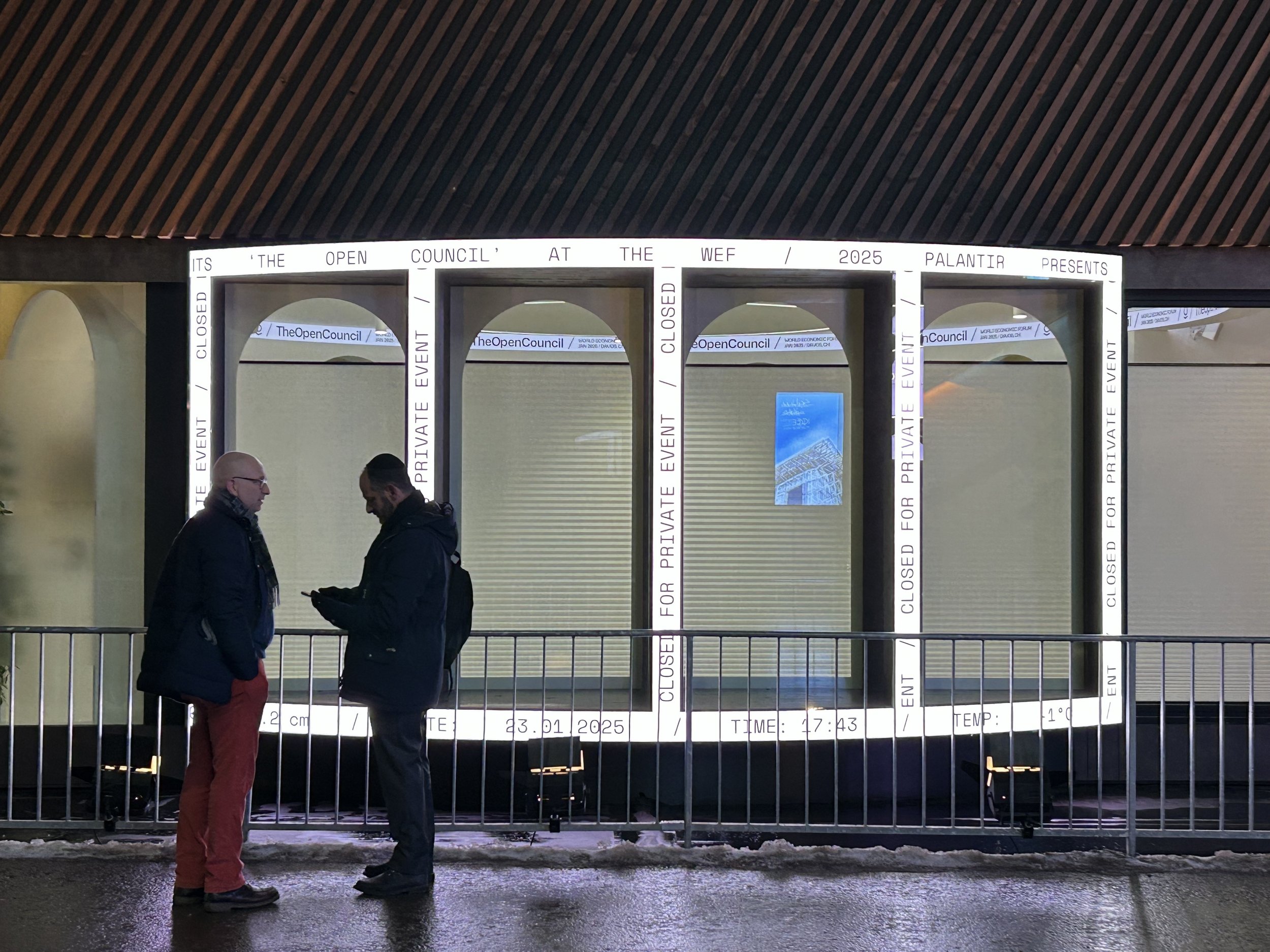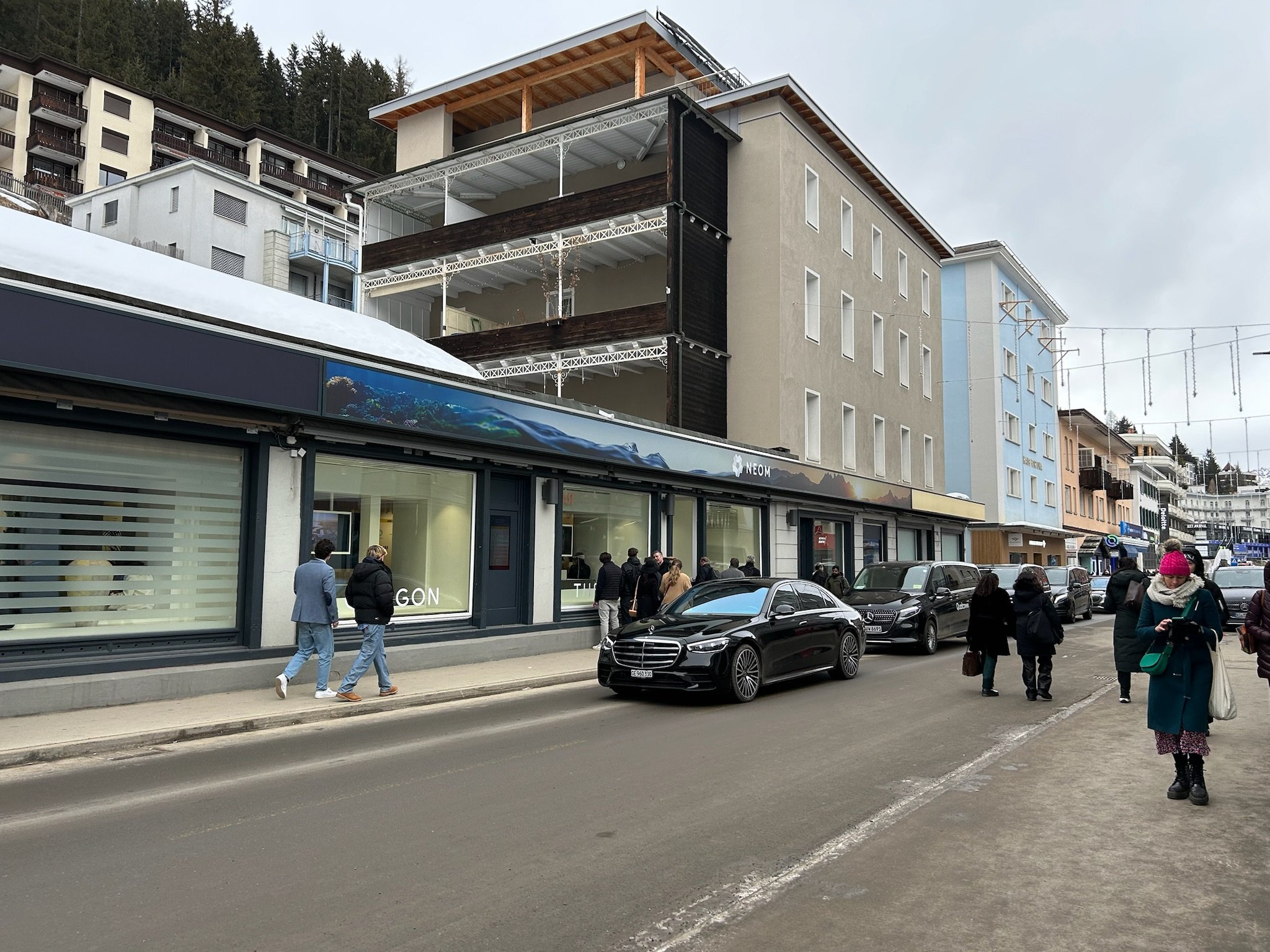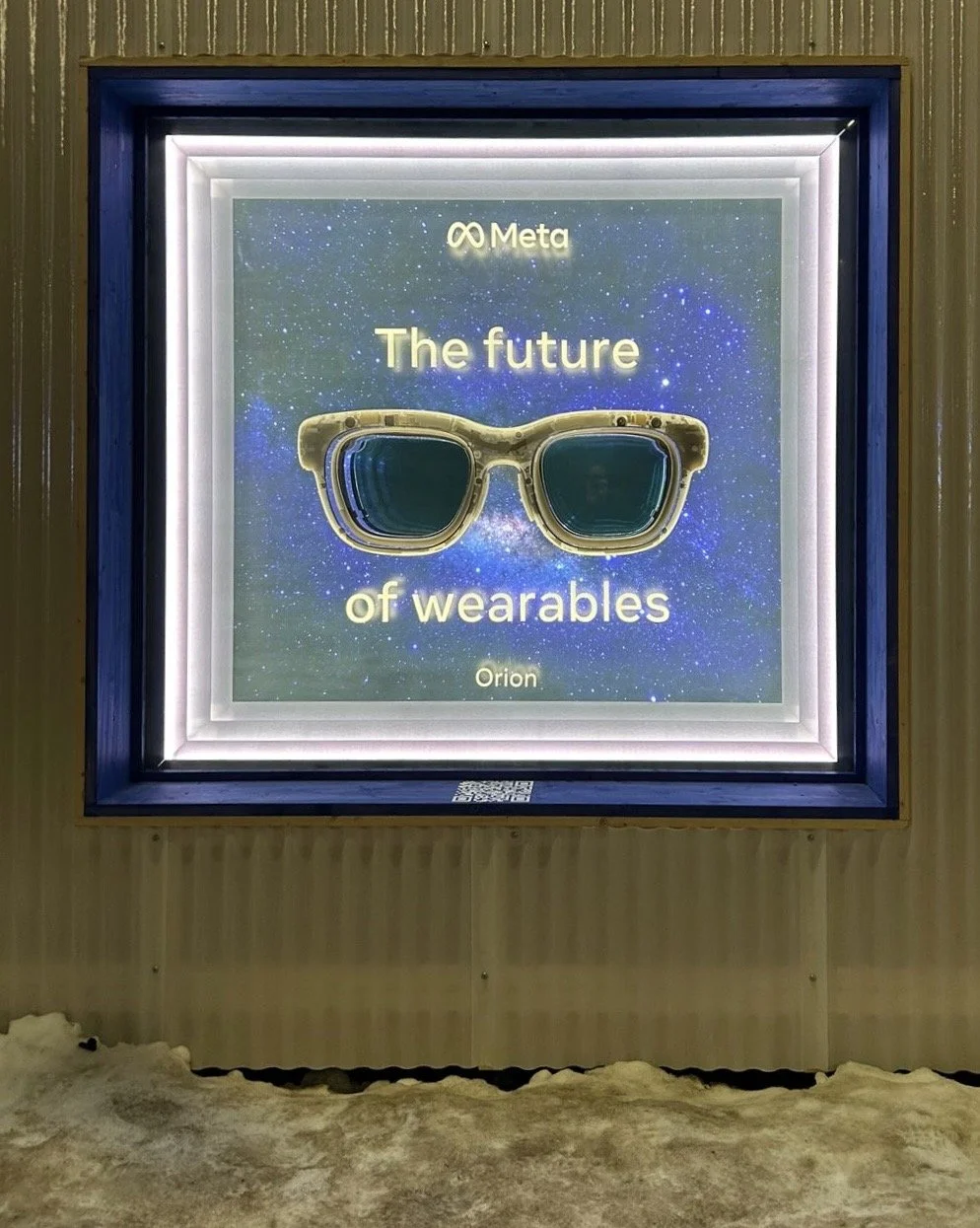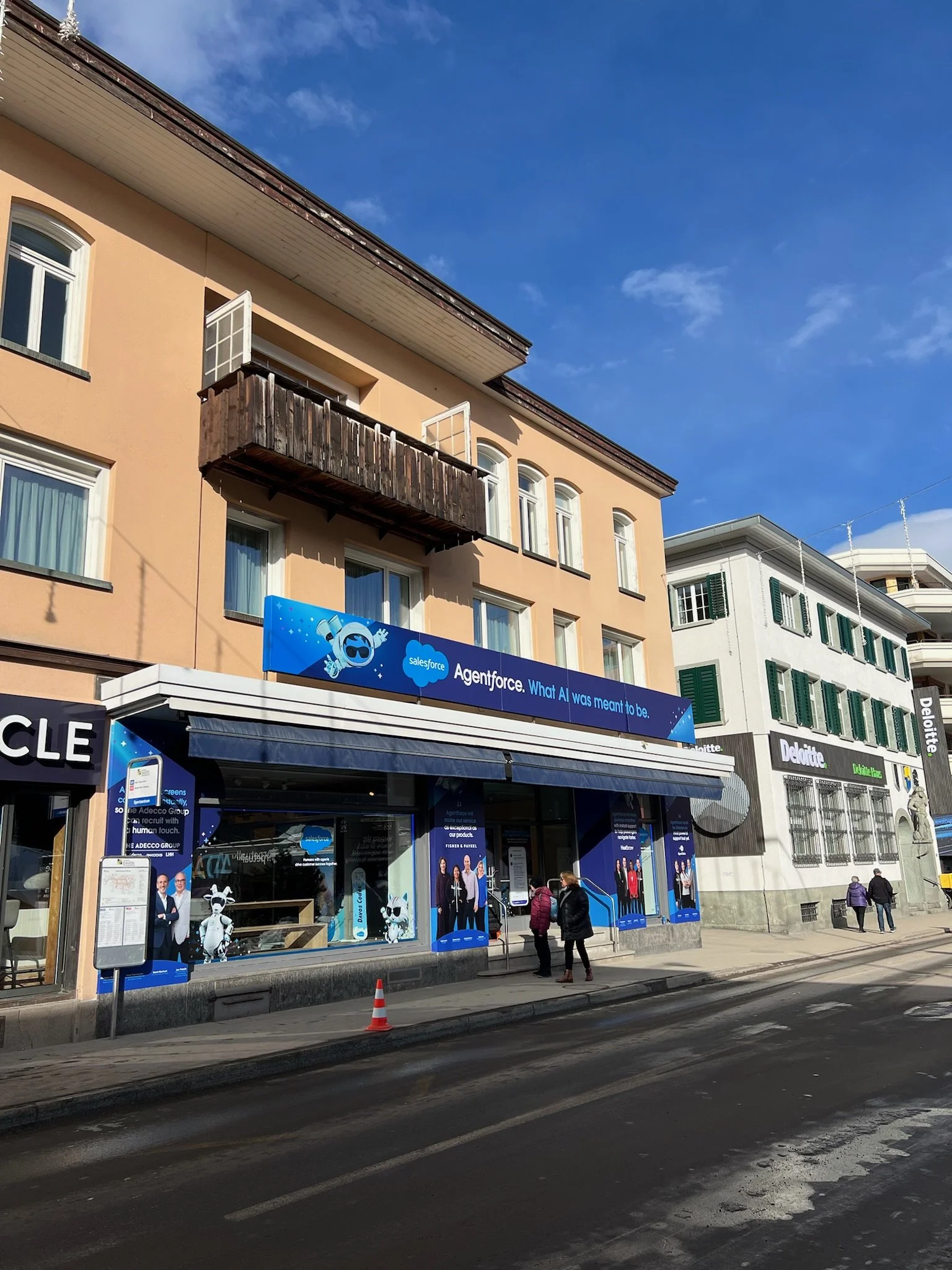
OHK's Strategic Insights from the
2025 Davos Economic Forum
Our Observations on Economic Alignment, Ethical AI, Green Finance, and Resilient Development
In its eighth year at Davos, OHK had its finger on the pulse of the Forum’s evolving agenda—engaging in high-level deliberations, bespoke workshops, and strategic conversations across development, finance, and technology sectors. This year’s theme, “Rebuilding Trust,” shaped our discussions on blended finance in emerging markets and AI ethics with leading policymakers. Amid deep societal divides and market volatility, we explored urban resilience collaborations with sovereign-investment entities and joined climate-finance forums to prototype green investment vehicles. From data-governance deep dives to community-driven adaptation panels, one message emerged clearly: restoring public and institutional confidence underpins every pathway to sustainable, inclusive growth. The following sections distill our most critical insights and actionable observations from Davos 2025.
Reading Time: 20 min.
Among the sleek tech pavilions and corporate showcases at Davos 2025, The Sanctuary offered a different kind of space—quiet, grounded, and rooted in reflection. Hosted by CNBC and NBCUniversal inside a historic church, this venue became a symbolic gathering point for discussions that centered on values, legacy, and collective humanity. the venue primarily hosted discussions centered on global economic trends, technological advancements, and leadership insights. Topics included geopolitical shocks, the AI revolution, energy transitions, and conversations with prominent figures.
Here are OHK’s 10 Key Takeaways from Davos 2025: These takeaways capture more than events or venues—they capture a mindset. A mindset that values slower dialogue, rooted knowledge, and the importance of cultural space in shaping equitable development. As we continue supporting community-driven adaptation, inclusive growth, and ethical innovation, we are reminded that lasting solutions don’t begin with answers—they begin with listening.
1. Global Economic Synchronization Efforts Highlight Divergent Growth Trajectories and Collaborative Investment Strategies Across Emerging Markets
We observed that global leaders negotiated synchronized fiscal policies, coordinated targeted stimulus measures, and established robust public-private partnerships to mitigate regional inequalities, bolster long-term investment commitments, and support resilient development frameworks amid escalating geopolitical tensions.
Africa Collective at Davos 2025: Advancing Regional Integration and Investment Readiness: At the heart of Davos 2025, the Africa Collective pavilion served as a strategic hub for dialogue around Africa’s growing role in global economic rebalancing. Prominently hosted by the African Export-Import Bank (Afreximbank) and supported by the African Continental Free Trade Area (AfCFTA), the space convened leaders in development finance, pharmaceuticals, and banking to accelerate the continent’s investment readiness and policy alignment in an increasingly volatile global economy. This image captures the signboard outside the Africa Collective venue—more than a directional marker, it represents Africa’s unified presence in shaping the global economic conversation. Lead partners such as Novartis and Standard Bank underscored the public-private cooperation needed to unlock scalable solutions across health systems, infrastructure financing, and intra-African trade facilitation. For OHK, the Africa Collective offered crucial insights into how African-led institutions are mobilizing capital through innovative mechanisms like pooled investment vehicles and green finance instruments. The AfCFTA’s presence reinforced conversations on regulatory harmonization and cross-border trade facilitation, essential to driving inclusive growth across the continent’s diverse economies. As part of our engagement, OHK observed firsthand how platforms like this strengthen alignment between regional ambitions and global financing tools. The African delegation’s emphasis on blended finance, digital infrastructure, and sovereign resilience mirrors many of the themes OHK continues to advance through our work with development banks and sovereign partners. In a year where the theme was “Rebuilding Trust,” the Africa Collective exemplified regional leadership, strategic collaboration, and a shared commitment to long-term transformation.
OHK’s presence noted recurrent calls for macroeconomic policy alignment to manage inflation in advanced economies while addressing liquidity constraints in developing markets. New pooled-investment vehicles—linking sovereign wealth funds, MDBs, and private capital—were introduced to underwrite sustainable urban and energy projects. For instance, in East Africa, regional solar micro-grid initiative co-financed by climate funds and local pension assets was a highlight. Moving forward, integrating scenario-based macroeconomic modeling into project designs and proactively shaping blended-finance arrangements will be essential to balance risk, mobilize capital, and maximize impact across regions with divergent growth paths.
2. Cross-Industry Acceleration Of Digital Transformation Through Quantum Computing, Blockchain Integration, And Strategic Partnerships
We noted that pilots in quantum algorithms, distributed ledger frameworks, and joint innovation ecosystems are streamlining operations, securing data integrity, accelerating cross-sector value, and unlocking transformative applications across supply chains and public infrastructure systems.
Democratizing Robotics at Davos 2025: Digital Transformation in Motion: In a moment emblematic of Davos 2025’s focus on real-world technological breakthroughs, this photo captures an interactive demonstration of a cutting-edge quadruped robot navigating the Forum’s promenade. Developed with precision engineering and likely powered by AI-driven spatial awareness systems, this robot represents the convergence of hardware, software, and systems innovation—a physical manifestation of the digital transformation themes explored throughout the week. Crowds gathered to observe as engineers and onlookers discussed the robot’s potential applications in infrastructure inspection, disaster response, logistics, and even telepresence. Its presence in a public setting underscored a key narrative of the year: technology must not only advance—it must engage. OHK’s conversations in breakout sessions with leaders from university labs, startups, and corporate R&D teams reinforced this sentiment, with live demos helping bridge abstract breakthroughs to tangible value.
These physical embodiments of digital transformation are more than showpieces. They showcase how quantum sensing, AI navigation, and data integrity protocols (like those built on distributed ledger technologies) are becoming actionable tools across supply chains, infrastructure monitoring, and public services. For OHK, the scene highlights why strategic partnerships between tech developers, academic research labs, and public infrastructure entities are critical to compress innovation timelines from years to months. We continue to advise agencies and MDBs on funding proof-of-value pilots, integrating decentralized trust systems into public platforms, and designing human-centric innovation ecosystems.
At Davos 2025, robotics didn’t just walk—they sparked conversations about how emerging technologies are reshaping society’s connective tissue in real time. This demonstration was a visual reminder of the promise and responsibility that comes with digital transformation.
In interactive break-outs, OHK engaged with startups and corporate R&D leaders demonstrating blockchain-based supply-chain traceability in cocoa processing and quantum-enhanced logistics optimization for last-mile delivery. Collaborative accelerators—combining university labs, incubators, and corporate venture units—have compressed proof-of-concept cycles from years to months. For instance, in Nigeria, a pilot using blockchain to trace vaccine shipments has reduced loss rates by 18%. OHK sees a strategic role in convening these ecosystems, advising development agencies on funding proof-of-value studies, and embedding decentralized trust mechanisms into public infrastructure initiatives such as GIS-based resource mapping or smart grid deployments.
3. Revolutionizing Green Finance Through Sustainable Investment Instruments, Carbon Pricing Mechanisms, And Cross-Sector Climate Risk Partnerships
Our analysis indicates that transition-linked bonds, blended concessional loans, and satellite-verified carbon-removal certificates are mobilizing private capital while driving robust ESG accountability across renewable energy and climate-smart agriculture portfolios, incentivizing measurable emission reductions for stakeholders.
Invest Qatar at Davos 2025: Climate Finance, Capital Markets, and the Gulf’s Green Investment Pivot: Radiating under the Davos night sky, the Invest Qatar pavilion served as a vibrant symbol of the Gulf’s shifting economic agenda—one increasingly focused on sustainable investment, diversified finance, and climate-aligned growth. Its bold presence aligned with this year’s heightened focus on green finance instruments, carbon markets, and cross-sector risk-sharing models. Qatar, like several GCC countries, is rapidly positioning itself as a hub for climate-smart capital flows—leveraging sovereign funds, development finance, and foreign direct investment to accelerate projects in renewable energy, blue economy initiatives, and water-efficient infrastructure. At Davos, OHK joined discussions that explored how the Gulf can help shape the next generation of blended finance tools—from decarbonization-linked bonds to satellite-verified carbon removal credits.
Sessions inside and around the pavilion reflected a regional consensus: to remain globally competitive, Gulf nations must invest in sustainability—not just through narrative, but through financial mechanisms with measurable outcomes. OHK engaged with policy leaders and fund managers examining how concessional finance, ESG performance metrics, and climate-linked instruments can de-risk projects across MENA and beyond. This image reflects more than an investment promotion booth—it signals a deeper transformation underway. For OHK, it reaffirmed the importance of aligning sovereign wealth strategies, MDB participation, and private capital to structure finance vehicles that reward climate resilience and equity outcomes. As the green finance ecosystem matures, Qatar’s proactive positioning at Davos illustrates how national investment platforms can catalyze global capital toward sustainable, future-proof infrastructure—offering a model for other emerging economies seeking climate-aligned growth.
At our climate-finance roundtables, OHK explored “decarbonization milestone” linkages in bond coupons and carbon-removal instruments validated by remote sensing, including blue-carbon credits for mangrove restoration in Southeast Asia. Development banks detailed blended technical-assistance grants tied to concessional finance, de-risking investments in off-grid solar and drip-irrigation systems. For our energy and resilience portfolios, OHK will integrate these instruments—structuring green bonds and impact funds—to attract competitive long-term capital, ensuring measurable emissions reductions. We will also develop standardized impact dashboards to report progress to investors and regulators.
4. Navigating Escalating Geopolitical Risks, Strengthening Global Supply Chain Resilience Through Diversification, Transparency, And Strategic Partnerships
We found that dual-sourcing models, AI-powered control towers, and public-private rapid-response collaboratives are enhancing supply-chain agility, transparency, resilience, providing real-time visibility and automated rerouting to protect flows of medical supplies, agricultural commodities, and industrial components.
Geopolitics on Display: Global Uncertainty and Strategic Supply Chain Dialogue at Davos 2025: Few images capture the spirit of Davos 2025’s undercurrent of geopolitical tension quite like this one: a closed-door session where world leaders addressed economic headwinds, security challenges, and the future of global trade—viewed here through the literal and figurative lens of transparency and scrutiny. Projected prominently on screen, U.S. President Donald Trump—whose policies are reshaping global trade dynamics—was a focal figure in conversations around economic nationalism, supply chain localization, and cross-border resilience. The session, attended by senior executives and policymakers, underscores a key Davos theme: the inextricable link between geopolitics and the architecture of global commerce.
Inside these forums, OHK joined sessions addressing how AI-powered control towers, near-shoring strategies, and real-time rerouting technologies are mitigating exposure to geopolitical chokepoints. Leaders detailed how public-private collaborations and regional scenario modeling are becoming essential tools to protect flows of medical supplies, food staples, and critical infrastructure materials in an increasingly fragmented world. From sanctions to taxes to trade corridors to energy dependencies, geopolitical volatility is reshaping risk profiles. For OHK, that means advising stakeholders on embedding digital twin simulations, geopolitical dashboards, and contingency planning protocols into national infrastructure plans and development-finance proposals. This image reminds us that behind the sleek design of Davos’s meeting rooms, hard conversations unfold—about sovereignty, trust, cooperation, and risk. OHK sees actionable frameworks for governments and investors striving to build resilient, transparent, and future-proof systems will continue to unfold in an era of global flux.
OHK’s team engaged with logistics and manufacturing executives who detailed how near-shoring and multi-sourcing reduce chokepoint exposure in critical corridors. AI-enabled control towers now ingest satellite AIS data, customs feeds, and geopolitical risk ratings to trigger automated rerouting. In the MENA region, For example, a pilot to integrate port-authority dashboards with rail-network APIs, slashing customs clearance times by 25%. Replicating these protocols in infrastructure-constrained areas—embedding geopolitical scenario analysis and advising on digital twin deployments—will safeguard critical flows of food staples, pharmaceuticals, and energy materials.
5. Strengthening Pandemic Preparedness And Health Security Through Integrated Surveillance, Rapid Response Protocols, And Cross-Sector Collaboration
Research presented shows that interoperable platforms merging wastewater surveillance, EHR syndromic flags, and genomic sequencing accelerate pathogen detection and coordinated responses, linking logistics operators and tele-health networks for efficient vaccine distribution and targeted containment strategies.
A Continent on the Move: Mobility, Preparedness, and the Future of Health Security in Africa: This striking poster—A Continent on the Move offers a poignant visual metaphor for one of the core challenges in global health resilience: movement. Whether across borders, regions, or economic sectors, mobility is both a driver of vulnerability and a vector for resilience. In the context of pandemic preparedness and health security, this image reminds us that surveillance systems, early warning protocols, and rapid-response mechanisms must be designed with mobility in mind. From migrant workers and informal trade networks to displaced populations and nomadic communities, Africa’s health security strategies must be agile, inclusive, and locally grounded.
At Davos 2025, OHK joined health security roundtables exploring integrated disease surveillance platforms, wastewater monitoring, genomic sequencing, and drone-enabled supply chains. But we also emphasized that no matter how advanced the technology, systems fail when they ignore the realities of movement and exclusion. Pilots in Africa combining telehealth, rapid diagnostics, and mobile health hubs showed promise when embedded within local governance and coordinated across ministries and sectors. As migration patterns shift under climate and economic pressures, cross-sector health collaboration must evolve to be proactive, not just reactive. This image—evoking tradition, transition, and resilience—symbolizes what is at stake: to build health systems not only to detect and respond, but to follow the people they are meant to protect. For OHK, that means supporting governments and agencies in designing flexible, mobile-compatible infrastructure that ensures no one is out of reach when the next crisis arrives.
In health-security sessions, OHK joined discussions on multi-sector task forces that pool data from ministries of health, logistics firms, and telemedicine providers. Tabletop exercises simulated cold-chain failures in rural clinics, prompting the design of mobile vaccine hubs. In Tanzania, a pilot for a rapid-response toolkit combining drone deliveries with real-time monitoring to mitigate stock-outs during measles outbreaks. We see an opportunity to assemble modular toolkits—bridging labs, clinics, and supply hubs—and integrate them into urban infrastructure designs, ensuring health systems can pivot swiftly when emerging pathogens arise.
6. Establishing Ethical AI Governance Frameworks To Ensure Responsible Innovation, Transparency, And Accountability Across Technology Ecosystem
We recognized that emerging model AI charters emphasizing human oversight, audit trails, and redress mechanisms are shaping responsible innovation across jurisdictions, and regulatory sandboxes demonstrate how to foster experimentation under ethical safeguards, enforcing bias audits.
The Open Council at WEF 2025: Shaping the Ethics of Emerging Technologies Behind Closed Doors: As artificial intelligence continues to reshape industries and societies, the stakes around governance, ethics, and trust have never been higher. This image, captured outside The Open Council pavilion hosted by Palantir at Davos 2025, evokes a quiet tension between innovation and oversight. Though branded as a place of open dialogue, the venue’s glowing borders repeatedly read “Closed for Private Event,” reflecting a paradox central to the AI discourse: the urgent need for transparency in a world of increasingly closed systems. The Open Council, while inaccessible to most, symbolized the weight of behind-the-scenes deliberations on algorithmic accountability, model governance, and the geopolitical implications of data sovereignty. OHK participated in adjacent roundtables focused on ethical AI frameworks—contributing recommendations on bias audits, inclusive data sourcing, and human oversight protocols inspired by pilots. The image above captures the atmosphere outside this venue and underscores the critical role of dialogue—formal and informal—in steering responsible technology futures. These kinds of interactions reinforce why OHK continues to advocate for context-sensitive governance models that balance innovation with accountability. Davos reminded us that in AI governance, what happens behind the scenes often shapes the rules for everyone.
During ethics roundtables, OHK contributed suggestions to context-sensitive AI guidelines, supporting lessons learned from pilots in the EU, Singapore, and Canada. Sandbox regulations demonstrate how regulators can both foster innovation and mandate bias audits. In Jordan, OHK is advising on a national AI policy that embeds these principles into digital-identity and tech projects in the MENA region. Embedding ethical checkpoints into project lifecycles—such as inclusive data sourcing and third-party audits—will enhance legitimacy and uptake of AI-enabled services in precision agriculture, public finance, and citizen services.
7. Mobilizing Climate Adaptation Through Infrastructure Investment Models, Public-Private Partnerships, Risk-Sharing Mechanisms, And Community Resilience Initiatives
Our review highlighted that resilience bonds, impact-linked water-retention loans, and participatory budgeting forums scale climate adaptation while distributing risk equitably, combining municipal and insurance guarantees to finance flood defenses, drought-resistant agriculture, and community-driven hazard mapping.
NEOM at Davos 2025: Climate-Resilient Urbanism and the Future of Adaptive Infrastructure: Prominently featured for the second consecutive year, NEOM once again commanded attention at Davos 2025 as a global touchstone for futuristic infrastructure, climate adaptation, and bold development ambition. With a high-traffic presence on the main promenade, the project continues to symbolize the intersection of technology, sustainability, and geopolitical ambition. What is less known is that OHK was the original envisioning force and strategic planner for NEOM, working under Saudi Arabia’s previous kingship. In its earliest stages, OHK shaped a vision focused on desert-climate resilience, scalable infrastructure, and smart urbanism grounded in feasibility and regional sustainability principles. The foundational concept was visionary yet anchored—prioritizing long-term livability, resource efficiency, and cross-sectoral innovation.
While NEOM’s current iteration has evolved to include more extravagant and attention-grabbing elements, OHK’s original planning was not as fantastical as some of the more recent features. It was a forward-looking but pragmatic blueprint—one that emphasized systems integration, climate-conscious design, and regional economic diversification. Much of that underlying logic continues to influence the current administration, which has carried elements of that foundational framework forward. At Davos, NEOM’s pavilion served as a platform for serious conversations around resilient megacity planning, blended finance, digital infrastructure, and environmental stewardship—core themes that remain consistent with OHK’s early work. These discussions echoed across other sessions on resilience bonds, participatory GIS tools, and adaptation finance—areas where OHK continues to advise multilateral banks and governments across the Global South.
As the world grapples with the realities of climate disruption, NEOM’s presence in Davos reminds us of the urgency—and complexity—of designing future cities. For OHK, it’s a legacy rooted in strategic realism, and one we continue to evolve with partners who share our commitment to resilient, adaptive development.
OHK examined coastal city case studies where municipal resilience bonds were underpinned by development grants and insurance tranches to fund sea-wall upgrades. In semi-arid Jordan, pay-for-performance water retention loans have improved groundwater recharge by 12%. Participatory budgeting in Cape Town integrated community hazard mapping into investment allocations. Our team will leverage these insights to design blended-finance structures, participatory GIS platforms, and local-stakeholder engagement plans that align private returns with sustainable adaptation outcomes, ensuring vulnerable populations are proactively protected.
OHK presented its work in Zanzibar on urban resilience, demonstrating how high-resolution GIS mapping and API-driven models combined with traditional community knowledge can forecast and guide data-based defenses. By overlaying satellite-derived elevation data with insights from local and participatory mapping workshops, OHK’s project, funded by the World Bank, can help identify hotspots and proposed measures to reduce exposure for hundreds of thousands of households. Our team leveraged these insights to propose that interactive participatory GIS platforms, country-wide Spatial Data Infrastructures that integrate real-time sensor APIs with reporting channels, and structure blended-finance vehicles that align private capital with restoration, ensuring Zanzibar’s most vulnerable communities benefit from data-driven, culturally anchored adaptation strategies.
8. Bridging Digital Skills Gaps With Transformation Strategies, Workforce Upskilling Initiatives, And Equitable Technology Access Programs
Meta’s Orion at Davos 2025: Reimagining Inclusion in the Age of Wearable Intelligence: Meta’s futuristic display for Orion sparked conversations on digital access, immersive learning, and equitable tech futures. While wearables offer new frontiers for interaction and knowledge-sharing, their adoption depends on widespread digital literacy and inclusive training pathways. At Davos, OHK advocated for offline-capable learning tools, micro-credentialing, and access models that ensure emerging tech empowers—not excludes—underrepresented communities. For the Global South, the question isn’t just “what is wearable,” but “who gets to wear it—and why.”
At Davos 2025, conversations around digital inclusion made it clear: the digital divide is no longer just about connectivity—it’s about capability. While cutting-edge technologies like AI wearables and immersive learning platforms dominated product showcases, the real challenge lies in ensuring equitable access to the skills and tools needed to engage with them meaningfully. As wearable tech and AI-driven platforms reshape job markets, OHK continues to work with governments and private partners to co-design training pathways that are inclusive, adaptive, and measurable—ensuring that the future of technology is accessible to the majority, not just the digitally privileged few.
In addition, we see mobile-first e-learning platforms, accredited micro-credentials, trainer cascades bridging skills gaps in underrepresented communities, using offline modules, local-language content, and skills passports to certify learners and foster inclusive workforce development with equitable tech access.
In skills sessions, OHK studied work to deploy offline-capable learning modules in rural India and West Africa, ensuring low-bandwidth connectivity. Tech firms shared accredited micro-credentials recognized by regional industry groups, while NGOs executed cascading trainer models in migrant camps. A case study from Nigeria’s ministry of education to pilot a digital skills passport, tracking both formal coursework and informal apprenticeships was a worthy model for Africa. We recommended the co-design of curricula with local institutions, integrate M&E dashboards, and forge partnerships to close digital divides and drive inclusive technology adoption across sectors.
9. Championing Indigenous Rights And Community-Based Development Through Equitable Resource Management, Cultural Preservation, And Governance Frameworks
We identified that joint-venture forestry agreements and community-led eco-tourism models are embedding indigenous leadership and equitable benefit sharing into development, integrating traditional knowledge in conservation, codifying customary land tenure, and generating sustainable livelihoods through revenue-sharing.
Presenters from Latin America showcased joint-venture forestry projects in Mexico that allocate 60% of profits to local communities, while Pacific Island eco-tourism ventures fund cultural heritage centers. Legal experts reviewed steps to codify customary tenure in national statutes, reducing land disputes. OHK’s social-inclusion work was presented especially methods to integrate co-management approaches into rural development and urban regeneration roadmaps—ensuring that marginalized groups lead governance, preserve traditions, and improve social cohesion alongside environmental stewardship.
10. Shaping The Future Of Work Through Strategic Workforce Re-Skilling, Lifelong Learning Initiatives, And Organizational Models
Discussions revealed that embedded learning pods, AI-driven assessments, and stackable credential frameworks facilitate real-time upskilling transitions, integrating employer partnerships and AI recommendation engines to customize learning journeys and align skill supply with labor-market demands.
Salesforce’s Agentforce at Davos 2025: Reimagining Work Through AI and Human Potential: At Davos 2025, the transformation of work took center stage—nowhere more visibly than at Salesforce’s Agentforce activation, emblazoned with the tagline “What AI was meant to be.” This image, captured on the main promenade, highlights one of the Forum’s key narratives: harnessing artificial intelligence not to replace human roles, but to amplify them. Agentforce emphasized an AI-powered future grounded in empathy, personalization, and inclusive workforce evolution. Positioned across from major global employers and consultancies, the installation invited visitors to explore how intelligent systems can support employee engagement, streamline workflows, and enable lifelong learning. Inside the pavilion, interactive demos showcased AI-driven career guidance tools, voice-enabled onboarding systems, and equity-conscious hiring algorithms—each designed to empower workers and employers alike.
For OHK, these examples affirm the importance of pairing technological innovation with ethics, transparency, and strong labor-market alignment. OHK sees these systems as catalysts for opportunity. But they must be localized, inclusive, and supported by metrics that ensure tangible upskilling and promotion outcomes—especially in underserved regions. Salesforce’s presence at Davos reminded the global community that AI’s true potential lies in its ability to serve people, not displace them. As we shape the future of work, OHK continues to advise governments and development partners on how to embed responsible tech, foster lifelong learning, and build resilient talent ecosystems that evolve with changing demands—while staying rooted in human values.
OHK joined leaders from manufacturing and finance highlighting on-site learning hubs offering modular, just-in-time training aligned to evolving job profiles. In Egypt, a pilot with a major bank embedded AI assessments into employee development plans, boosting promotion rates by 15%. University-industry partnerships showcased stackable certifications recognized across employer networks in the Gulf region. OHK recommended that advising public workforce agencies on integrating these adaptive platforms into regional development strategies should use performance metrics that align skills supply with labor-market demand and foster resilient talent ecosystems.
India’s Semiconductor Push at Davos 2025: Foundational Infrastructure for a Digitally Interconnected Future: Displayed prominently at Davos 2025, this announcement from Tata Electronics captured global attention by spotlighting India’s bold entry into the semiconductor manufacturing space—a strategic move that signals the country’s ambitions to become a cornerstone of the global digital supply chain. With factories underway in Gujarat and Assam, India is investing not just in chips, but in the infrastructure that will power the next wave of AI innovation, quantum systems, edge devices, and blockchain-enabled tools. At OHK, we view semiconductor ecosystems as more than a hardware bet—they are national capacity-building platforms that drive cross-sector resilience, data sovereignty, and technology independence.
This image speaks directly to the Forum’s wider narrative around digital transformation: how countries can leapfrog industrial gaps and assert technological agency through targeted investment, public-private coordination, and strategic foresight. At Davos, OHK participated in sessions examining regional tech acceleration, where India’s semiconductor vision was seen as a blueprint for emerging economies seeking to shape their own futures in a fragmented digital order. We believe that supporting ecosystem development—across design, fabrication, and application—will be essential to unlocking the full benefits of AI, quantum computing, and blockchain integration. For governments and MDBs, that means co-financing industrial corridors, building up technical talent, and embedding resilience and redundancy into critical technology systems. As global supply chains recalibrate, India’s move is not just an industrial pivot—it’s a strategic alignment with the future of global value creation. OHK continues to advise public and private actors on how to align similar investments with inclusive growth, long-term capacity, and digitally sovereign futures.
Davos 2025 reaffirmed that the most pressing global challenges—economic divergence, climate emergencies, technological disruption, and social inequities—are deeply interconnected and require coordinated, cross-sectoral responses rooted in local contexts. OHK’s varied observations highlight opportunities to blend technical expertise, stakeholder engagement, and innovative financing to drive sustainable development. In the coming months, our teams will:
Translate Insights into Actionable Frameworks: Develop standardized toolkits for blended-finance structures, participatory GIS platforms, and rapid-response health modules.
Deepen Multi-Stakeholder Ecosystems: Convene coalitions of public agencies, private investors, and community leaders to pilot proofs-of-value in targeted corridors.
Embed Ethical and Inclusive Practices: Integrate AI ethics checkpoints, indigenous co-management principles, and equitable skills programs into project lifecycles.
Scale Adaptive Learning and Workforce Strategies: Expand our digital-skills partnerships and credential frameworks to align talent supply with evolving regional market needs.
Approaching our tenth year at Davos, OHK’s work continues to delve deeper into global trends and inputs from world leaders. Discover how we partner with governments, multilateral development banks, private investors, and local communities to translate these insights into action—structuring blended-finance vehicles for climate-resilient infrastructure, embedding ethical AI frameworks into digital transformations, scaling inclusive digital skills programs, and co-creating community-led adaptation and indigenous co-management models that drive sustainable, equitable growth. Please reach out to OHK to get more information or discuss how we can help.

